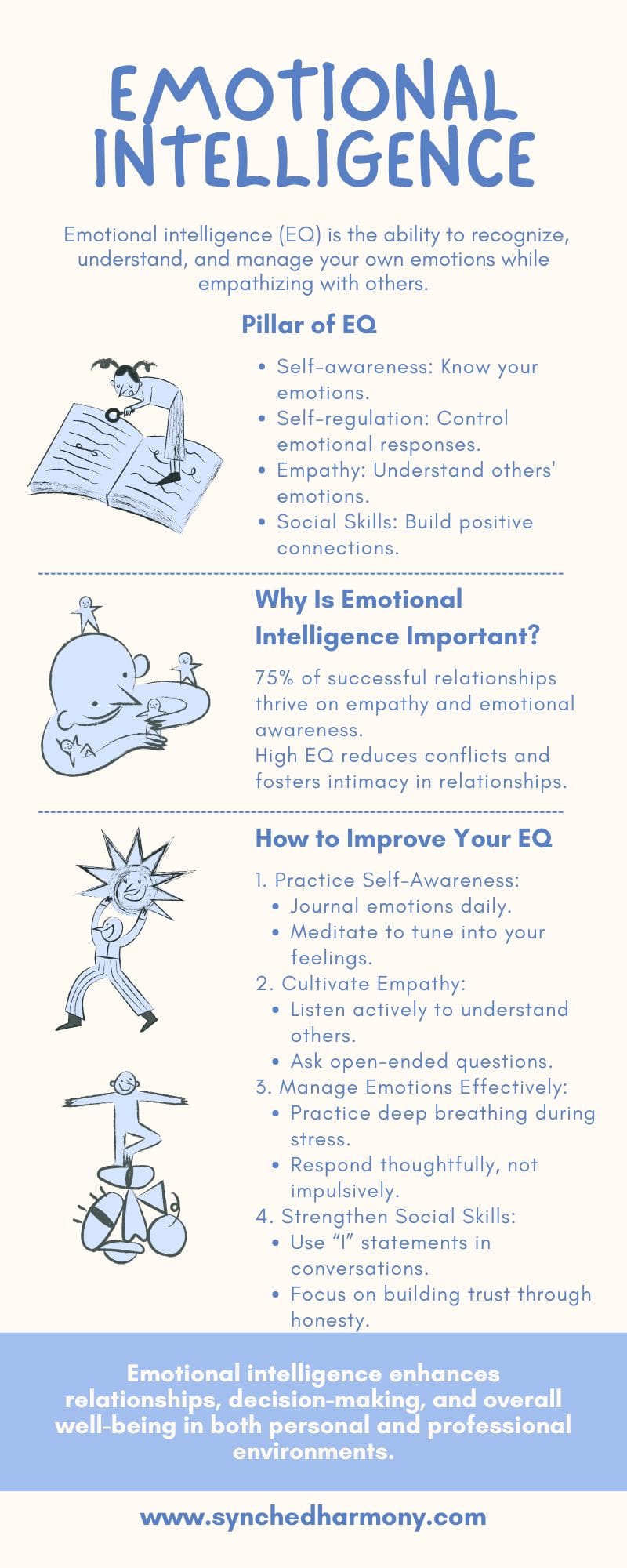In a world driven by emotions and connections, emotional intelligence (EQ) is the cornerstone of healthy relationships and personal well-being. Whether navigating marriage, stepping into a new relationship, or rebuilding after separation or divorce, emotional intelligence can transform how you connect, communicate, and thrive.
This guide will explore 10 actionable ways to boost your emotional intelligence and empower you to build deeper, meaningful connections.
What Is Emotional Intelligence?

Emotional intelligence refers to the ability to recognize, understand, and manage your emotions while also being attuned to the emotions of others. It encompasses four main pillars:
- Self-awareness
- Self-regulation
- Empathy
- Social skills
Unlike IQ, which measures cognitive abilities, EQ influences how we interact with others, make decisions, and handle stress. Research shows that high emotional intelligence is directly linked to relationship satisfaction, workplace success, and overall well-being.
Why Emotional Intelligence Matters in Relationships
Building and maintaining healthy relationships require more than love. Emotional intelligence plays a crucial role in understanding your partner’s feelings, resolving conflicts, and fostering trust. Here’s why:
- Enhances Communication: Understanding emotions helps you express yourself better and respond effectively to your partner.
- Builds Empathy: Recognizing and validating your partner’s feelings strengthens emotional bonds.
- Reduces Conflict: EQ allows you to approach disagreements calmly and rationally.
- Fosters Intimacy: Emotional attunement deepens trust and closeness.
Whether you’re married, dating, or recovering from a breakup, mastering emotional intelligence can transform your approach to relationships.

10 Ways to Improve Emotional Intelligence
Let’s delve into the actionable steps you can take to enhance your emotional intelligence and enrich your relationships.
1. Practice Mindful Self-Awareness
Being aware of your emotions is the foundation of EQ. Here’s how to get started:
- Journal Your Emotions: Write down how you feel and why. This habit helps you recognize emotional triggers.
- Pause and Reflect: Before reacting, take a moment to process your emotions.
- Meditate Regularly: Practices like mindfulness meditation can sharpen your emotional awareness.
Recommended Product: Check out the Mindful Journaling Workbook to kickstart your self-awareness journey.
2. Cultivate Empathy
Empathy is the ability to put yourself in someone else’s shoes. To develop empathy:
- Listen Actively: Focus fully on what your partner is saying without interrupting.
- Ask Questions: Show genuine interest in their experiences and feelings.
- Practice Perspective-Taking: Imagine how you’d feel in their situation.
3. Develop Self-Regulation Skills
Managing your emotions effectively is critical for emotional intelligence. Techniques include:
- Breathe Through Stress: Deep breathing exercises help you stay calm.
- Delay Reactions: Give yourself time to cool down before responding to conflict.
- Set Boundaries: Learn to say no to protect your mental health.
Recommended Product: Try the Calm App Subscription for guided breathing and meditation sessions.
4. Hone Your Communication Skills
Clear, empathetic communication is essential in relationships. Tips include:
- Use “I” Statements: For example, say, “I feel hurt when you…” instead of accusing.
- Clarify Intentions: Avoid misunderstandings by expressing your thoughts clearly.
- Practice Nonverbal Cues: Body language often speaks louder than words.
5. Strengthen Your Emotional Vocabulary
Being able to name and articulate your emotions is key to emotional intelligence.
- Learn Emotion Words: Expand your vocabulary to include terms like “overwhelmed,” “grateful,” or “disappointed.”
- Express Emotions Clearly: Share your feelings honestly with your partner.
Recommended Product: The Emotion Thesaurus is a helpful guide for learning how to articulate emotions effectively.
6. Embrace Vulnerability
Opening up emotionally builds trust and intimacy in relationships. To embrace vulnerability:
- Share Your Fears: Discussing insecurities fosters deeper connection.
- Be Honest About Needs: Expressing your emotional needs strengthens understanding.
- Take Risks in Communication: Say what you mean without fear of judgment.
7. Learn to Manage Conflict Gracefully
Conflicts are inevitable, but how you handle them determines the outcome. EQ-driven conflict resolution includes:
- Stay Calm: Avoid reacting impulsively during arguments.
- Focus on Solutions: Work collaboratively to resolve issues.
- Apologize Sincerely: Take responsibility for your mistakes.
8. Cultivate Emotional Resilience
Emotional resilience is the ability to bounce back from setbacks. To build resilience:
- Practice Gratitude: Focus on the positives, even in challenging situations.
- Stay Adaptable: Be open to change and flexible in your thinking.
- Lean on Support Systems: Build strong connections with family and friends.
9. Deepen Social Awareness
Understanding social dynamics enhances your ability to connect with others. Strategies include:
- Observe Nonverbal Cues: Pay attention to body language and facial expressions.
- Adapt to Situations: Be sensitive to cultural and social norms.
- Show Appreciation: Acknowledge and celebrate others’ successes.
10. Commit to Lifelong Learning
Emotional intelligence is a skill that evolves. Commit to continuous growth by:
- Reading Books on EQ: Stay informed about emotional intelligence strategies.
- Taking Online Courses: Platforms like Coursera and Udemy offer courses on EQ.
- Seeking Feedback: Regularly ask trusted individuals for feedback on your emotional responses.
Recommended Product: Enroll in the highly rated Emotional Intelligence Course on Udemy for an in-depth understanding.
How Emotional Intelligence Improves Your Well-Being
Boosting your EQ doesn’t just enhance relationships—it also has profound effects on personal well-being. Benefits include:
- Reduced Stress: Emotional regulation helps you manage anxiety and tension.
- Improved Mental Health: High EQ is linked to lower rates of depression and emotional burnout.
- Better Decision-Making: Understanding emotions leads to clearer, more rational choices.
Also Read: 10 Relatable Secrets About New Emotions in Inside Out 2 Movie
Inspiring Stories of Emotional Intelligence in Action
Story 1: Rekindling Love After Years of Conflict
Samantha and Jake, married for 15 years, were on the brink of separation. Through therapy, they learned to practice empathy and effective communication, transforming their strained relationship into one filled with understanding and affection.
Story 2: Overcoming Post-Divorce Challenges with EQ
After his divorce, Raj struggled with anger and resentment. By journaling, meditating, and focusing on self-regulation, he rebuilt his emotional resilience and fostered a positive co-parenting relationship with his ex-wife.
How to Foster Emotional Intelligence in Everyday Life
Building emotional intelligence isn’t a one-time effort; it’s a lifestyle that requires daily attention and intention. Integrating EQ into your routine helps solidify it as a lasting habit. Here are some simple yet impactful ways to practice emotional intelligence every day:
- Start Your Day with Intention: Take five minutes each morning to set an emotional intention for the day. For example, decide to approach challenges with patience or to listen actively during conversations.
- Check In with Yourself: Pause periodically to identify and name the emotions you’re feeling. This builds self-awareness and prevents emotions from spiraling out of control.
- Celebrate Small Wins: Acknowledge and reward yourself for moments of emotional control, empathy, or effective communication. Small successes reinforce good habits.
In Relationships
- Practice Gratitude: Make it a habit to thank your partner for the little things they do.
- Offer Emotional Support: When your partner is upset, focus on listening and validating their feelings instead of offering unsolicited solutions.
At Work
- Recognize Others’ Efforts: A simple compliment or acknowledgment can go a long way in building rapport.
- Adapt to Feedback: Use criticism constructively by reflecting on it calmly and making necessary improvements.
Fostering emotional intelligence in everyday life not only strengthens your relationships but also enhances your emotional resilience, making you better equipped to handle life’s challenges with grace.
By incorporating these practices, you can ensure that emotional intelligence becomes an integral part of your identity, empowering you to lead a more fulfilling and connected life.
FAQs About Emotional Intelligence
1. Can emotional intelligence be improved at any age?
Yes, EQ is a skill that can be cultivated at any stage of life with consistent practice.
2. How long does it take to develop emotional intelligence?
It varies, but small improvements can be seen within weeks of focused effort, while mastery may take years.
3. Are there tools to measure emotional intelligence?
Yes, tests like the Emotional Quotient Inventory (EQ-i) can assess your EQ levels.
Conclusion
To Conclude, emotional intelligence is an invaluable skill that impacts every facet of our lives—from relationships to personal growth. By incorporating these 10 strategies, you can transform your emotional landscape and build deeper, more fulfilling connections.
Start your journey toward higher emotional intelligence today. Check out tools like the Mindful Journaling Workbook or enroll in an Emotional Intelligence Course on Udemy to take the first step toward emotional mastery.
Call to Action: Ready to level up your emotional intelligence and create meaningful relationships? Share this article with a loved one and start the journey to a happier, more connected life together.

Greetings! I am the voice behind the thoughts presented on Synched Harmony. As an ordinary individual, I strive to live a life dedicated to achieving inner peace and serenity by cultivating harmony within and making difficult aspects of life work together in sync during tough phases of life. Life becomes much easier if we open ourselves to small changes and respect each other’s personal boundaries, creating space for shared happiness.

2 thoughts on “10 Powerful Ways to Boost Emotional Intelligence for Stronger Relationships and a Happier Life”